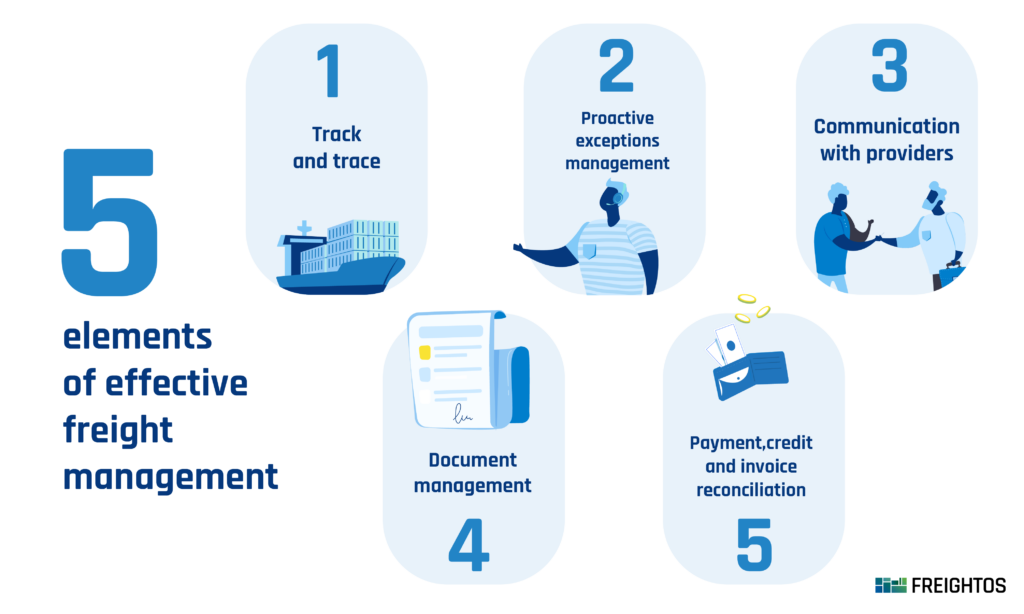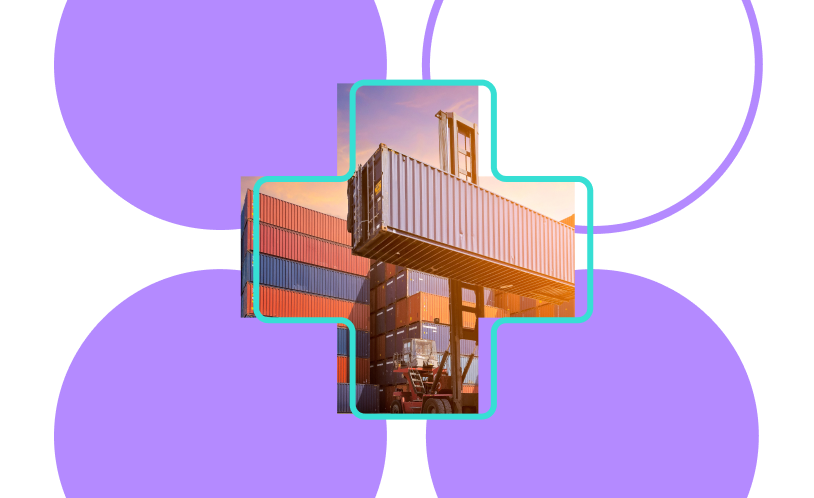Shipping global freight means managing a lot of details all at once: paperwork, communication with providers, customs regulations, delay prevention, adapting to changing market conditions – it’s a lot.
That’s where a freight management system comes in.
Read on to learn:
- What good freight management is
- Why freight management goes (far) beyond booking your shipment
- How to find a system that works for you

Looking to ship and manage freight in one place?
What is the meaning of freight management?
Moving freight around the globe is complex. Involving multiple people, modes of transport, regulations, and technologies, each step needs to be supervised and managed for a secure, efficient, and cost-effective supply chain.
Of course, a huge part of managing your shipment is actually making a plan to move your goods: comparing prices, choosing a lane and mode, finding a provider, and booking the shipment.
But there’s a lot more that goes into keeping your goods moving – and to making your process as efficient and painless as possible.
In this guide, we’ll explore the practical elements of comprehensive freight management, detailing what you need for a supply chain that just works.
Shipment management – beyond booking
Here are the crucial steps to effective freight management:
- Tracking and tracing
- Document management
- Proactive exceptions management
- Payment, credit, and invoice reconciliation
- Communication with providers
Let’s go through them one by one:
Tracking and tracing your shipment
Tracking your goods begins as soon as they leave the factory; it’s important to be able to track pickup from the factory, arrival at the origin port, the sea or air journey, arrival at the destination port, customs clearance, and transit to your warehouse. Transparent tracking means you can stay on top of delivery time and flag any delays. Problems tend to emerge particularly at the seams, during handoffs between providers.
Document management
There’s no escaping it: shipping freight involves a significant amount of paperwork. You’ll need a commercial invoice, a bill of lading, insurance forms, customs clearance forms, and more. While your forwarder will help you obtain and fill out these forms, you also need a centralized place to keep them, access them, and share them easily with your team and providers.
Exceptions management
No one wants to hear that something has gone wrong with a shipment, but snags do happen when moving goods around the world. Delays can occur due to weather, port congestion, warehouse backups, unexpected customs inspections, or global supply chain catastrophes (looking at you, 2020). Goods are sometimes damaged or even stolen. If things don’t go as planned, you want to be able to access your data and communicate with providers to find a solution before the problems get unwieldy – and very costly.
Invoice reconciliation
Billing is often complicated, but it shouldn’t be. When you review your freight costs, you should be able to understand each and every charge for each and every shipment. Lump-sum charges are a red flag, not to mention a major headache.
Communications with your forwarder and other providers
When you’re managing a supply chain, communication is key. How will you reach your forwarder? Your customs broker? Your insurance agent? What if you have multiple shipments with different forwarders shipping at the same time? You might need to manage an unexpected delay, or to send routine forms from one provider to another. With a platform to reach all your providers, these steps become much smoother.

What is a freight management system?
With all these steps to manage, a freight management system is critical.
If you find yourself lacking an organized system, you’re not alone. Traditionally, importers and exporters have had to cobble together their own system, using various spreadsheets to keep track of shipments with different forwarders, storing documents in files or scattered across emails, and emailing or calling each provider separately.
As the freight world embraces digitalization, many freight forwarders use platforms that allow importers and exporters who ship with them to track shipments, typically via milestone reporting, and manage communications. However, these platforms tend to work only for individual shipments placed with that forwarder. They don’t provide a single system for tracking, communication, and documentation across all shipments.
But as your business grows, you’ll want to be able to reach your providers seamlessly, keep all your documents for all your shipments in the same place, access and share information with your team easily, get transparent tracking, and manage billing smoothly and transparently. This becomes even more important if you’re using multiple forwarders (and if you’re not, it’s easy to start).
The Freightos.com platform not only allows you to search quotes and book your shipments – it also allows you to manage all other shipment management needs in one place. By using Freightos.com, you can centralize your operations and simplify the management of your entire supply chain.
Freight management can be easy
The benefits of a freight management system
In addition to providing you with specific freight management services, a comprehensive freight management system offers a number of benefits:
Efficiency
With an effective freight management platform, you’ll save time and streamline your processes. You won’t have to search for or redo documents, chase people over phone or email, pore over unclear invoices, or track different shipments on different platforms, which means you’ll have more time to grow your business. And with every shipment tracked and managed in one place, you’ll get insight into what’s working and what’s not, so you can improve your supply chain, whether that means shipping on more lanes and routes, adjusting your cadence, or working with multiple forwarders.
Accountability from providers
Greater transparency into the nitty gritty details of your supply chain means it’s far easier to hold your providers accountable for transparent pricing, timeliness, and communicating any issues that arise.
Scalability
As your business grows, you’ll manage more shipments. This growth translates to managing more paperwork, tracking, and communication. Having a comprehensive freight management system in place means it won’t matter if you’re shipping 50 times a year or 500 – it’s all accessible, and it’s all doable.
Adaptability
The global freight market moves fast, and you want your business to move with it. A freight management system allows you to gain quick insight into your supply chain and adapt when needed – and when management is easier and faster, you have more time to think about growth. At Freightos.com, we love dealing with freight, but we also know that the less time you have to spend dealing with it, the better.


